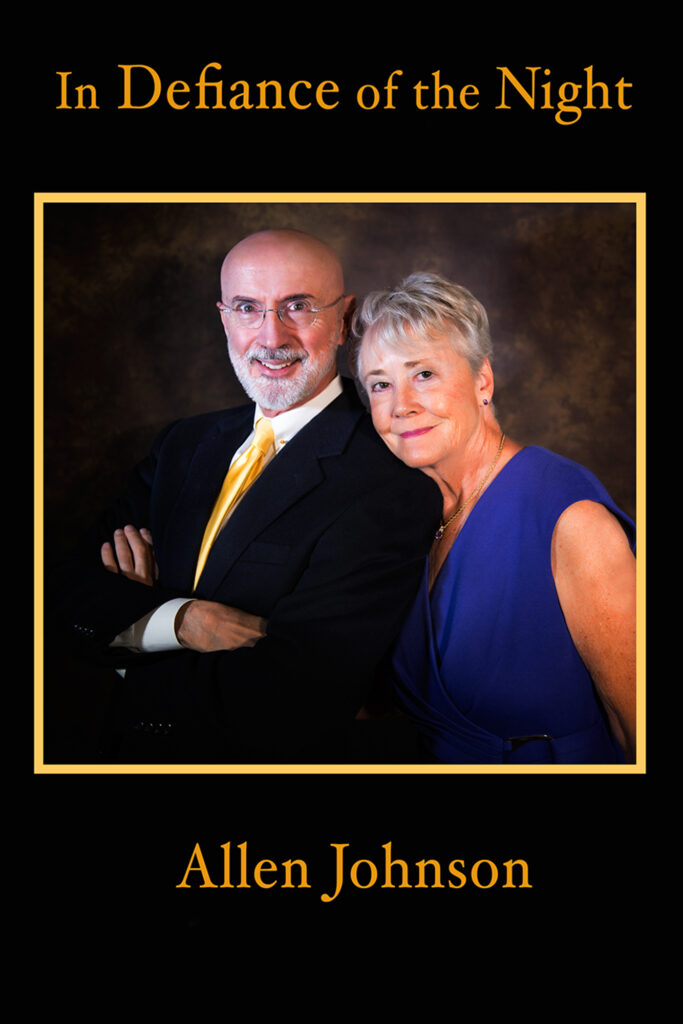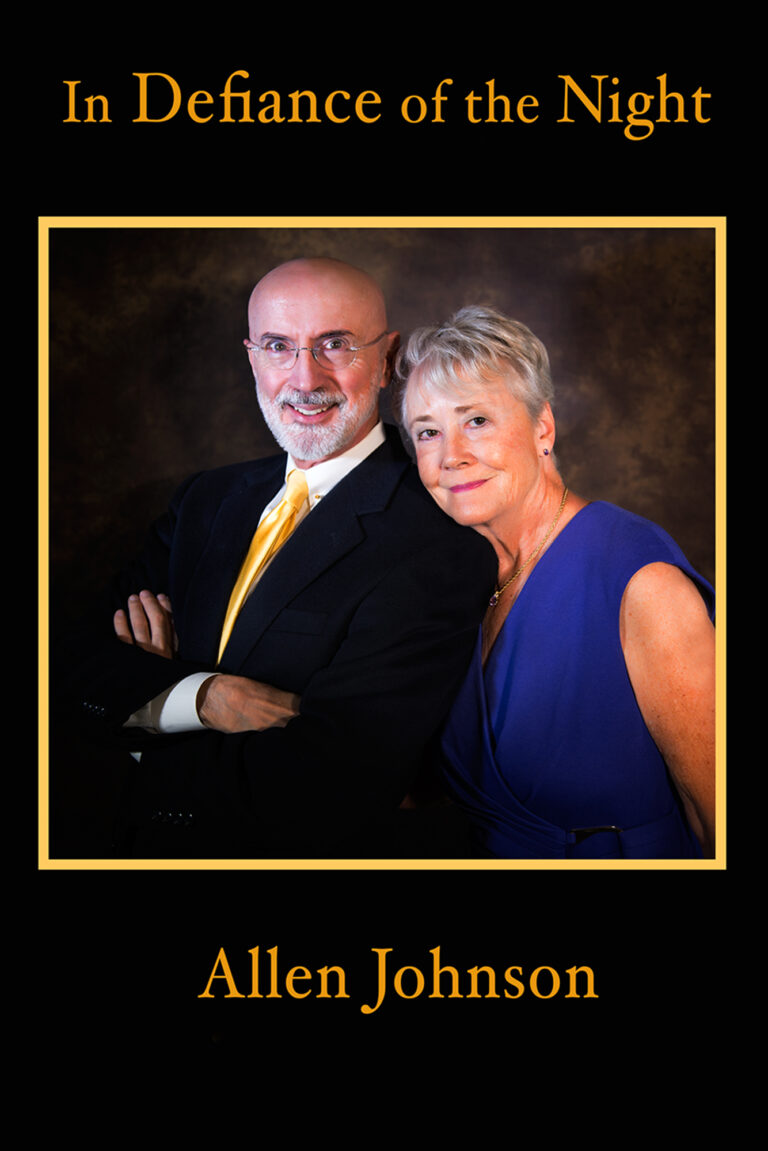There’s a difference between the cancer of the mind and the cancer of reality. Disease is no different than any other life challenge. Although it may slap you down, it does not have to stamp you out—not if you use your brain.
Decades ago, while I was working on my doctorate in psychology, I was introduced to a book that redefined my sovereignty within a dispassionate world. The work was Choice Theory: A New Psychology of Personal Freedom by the psychiatrist, William Glasser. This is what I learned.
The Five Basic Human Needs
According to Glasser, there are five basic human needs: survival, love, power, freedom, and fun. Each state is related to the others. If we have too little power, freedom may wane. If we have too much fun, survival may extinguish.
Nita’s diagnosis of Parkinson’s Disease and mine of cancer was a gut punch to all our human needs. The only exception was love, which expanded between ourselves and among our neighbors. Still, medical challenges shifted our worldview. What does that mean?
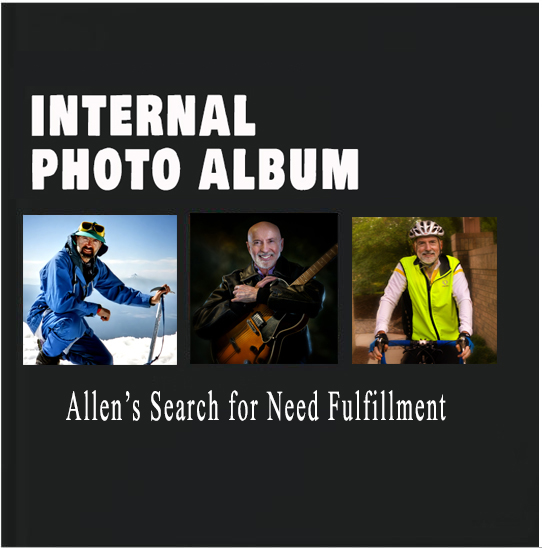
All human beings possess an inborn desire to satisfy their personal needs. For example, to quench their craving for power, they might picture themselves as politicians or entertainers or entrepreneurs. Those pictures are collected in a photo album that is locked away in their heads. But the hard work is yet to come. Now, they must compare their internal pictures with the real world swirling about them. Will they be able to make their dream images a tangible truth?
When I first saw Nita from a distance, I pasted a high-definition image of her into my internal photo album. But having the picture doesn’t guarantee the desire will be fulfilled. I had to get to work; I had to woo her. Luckily, she loved me as much as I loved her. And her image has been in my internal photo album ever since.
The security of Nita’s love allowed me to return to my basic needs and transform other pictures into reality. I never had to worry about the need for survival. My wife and I were privileged to have college educations and stable professions, which also contributed to our sense of power.
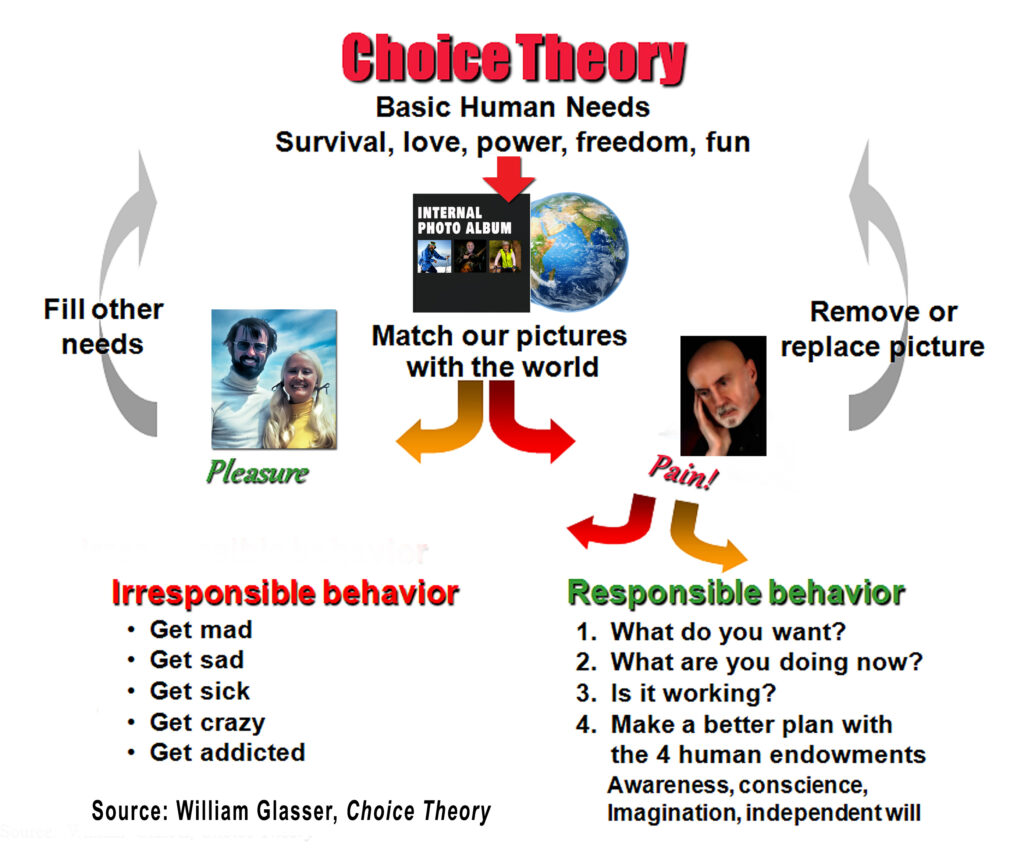
With our finances secure, I had the freedom to explore other pleasures. I am by nature curious, and satisfying my curiosity is a fun-filled experience. That’s why I learned how to speak French, fly airplanes, climb mountains, and play piano. And with each success, I returned to my list of dream images and asked, “What will the world grant me now?”
However, when Nita and I were diagnosed with life-threatening diseases, our internal pictures of health evaporated against a backdrop of flagging dopamine and raging cancer cells. That discrepancy—between what we wanted and what the world supplied—created pain.
Here’s a rule of nature: people will not endure pain for long without doing something. But not everyone seeks a sensible solution.
There are three ways to deal with pain: a poor way, a better way, and the best way. Let’s examine all three approaches.
A Poor, Irresponsible Strategy for Managing Pain
The least-effective pain-management option is irresponsible behaviors. Unfortunately, many in anguish turn to anger, depression, sickness, craziness, addiction—or any combination of such ill-conceived strategies.
People adopt irresponsible behaviors because the tactics are often socially tolerated. Two favorites are depression and addiction.
Depression. Some people choose to brandish depression like a sledge hammer.
“Don’t ask me to get out of bed. My whole life is a train wreck.”
“That may be true, but—”
“But nothing. It’s the way it is. And I’m too depressed to do anything about it.”
“Well, you make a good point. Maybe you need time to heal.”
Bingo! The person in pain feels smug. He or she used a get-my-way tactic—“Oh, woe is me”—and was vindicated by playing the victim. And it worked: permission to behave irresponsibly was granted. “Yeah, that’s what I need,” the unhappy person says. “Time. Lots and lots of time.”
Addiction. The second favorite irresponsible behavior is addiction. It’s a way of anesthetizing ourselves against the grief of shattered needs. As a result, the wounded turn to sex, food, alcohol, or drugs to ease the agony. It’s hard to argue with their reasoning.
“You need to back off the booze,” a well-meaning friend says.
The afflicted smirks. “You’re a cruel master.”
“How’s that?”
“Alcohol is the one thing that diminishes the pain. And you want to turn off the spigot and turn up the torture. How dare you.”
For those who choose irresponsible behavior, their approach—though deeply flawed—is so ingrained in their worldview they cannot, will not entertain another option.
A Better Strategy for Managing Pain: Remove or Replace the Image
A simple yet effective pain-management option is to remove the picture or replace it with a more satisfying image. Suppose the picture of my love interest was not Nita but Raquel Welch. (I know it’s crazy but go with it for a minute.) With time, I’d surely conclude my chances of getting a glimpse of the movie-star were slim. Best to remove her picture and make room for another candidate—perhaps someone a trifle less glamorous but a truckload more grounded.
Here’s a more complicated (and more realistic) example. I was not willing to remove my image of good health, but the portrait could be redesigned to include a commitment to service in the background. Think of the edited photograph with subtle light on health and expanded light on service. More about creating a service-oriented image to follow.
The Best Strategy for Managing Pain: Responsible Behavior
The best plan for handling pain is a hallmark of responsible behavior. It’s applied by those who have the will and courage to problem solve. Glasser outlined a four-step process—one that I applied to my battle with cancer. What follows were my internal responses to each step.
Step number 1: What do you want?
I wanted peace—which is another word for the basic need for freedom. I knew I didn’t want to be a casualty of the disease. If I succumbed, cancer would be the victor and I the victim. And victims have no freedom.
Step number 2: What are you doing now?
At first, my mind was a mangled twist of ideas—that cancer was unfair, that it disrupted my life, that it made it impossible for me to be self-actualized or, better yet, transcendent. By “transcendent” I meant the faculty to focus less on my needs and more on the needs of others. But at the beginning, my vision was too blurred to entertain such noble ideas.
Step number 3: Is it working?
No. All the marinating in my misery was of no help. If anything, it jacked up the disease and drained my power.
Step number 4: Let’s make a better plan with the four human endowments: awareness, conscience, imagination, and independent will.
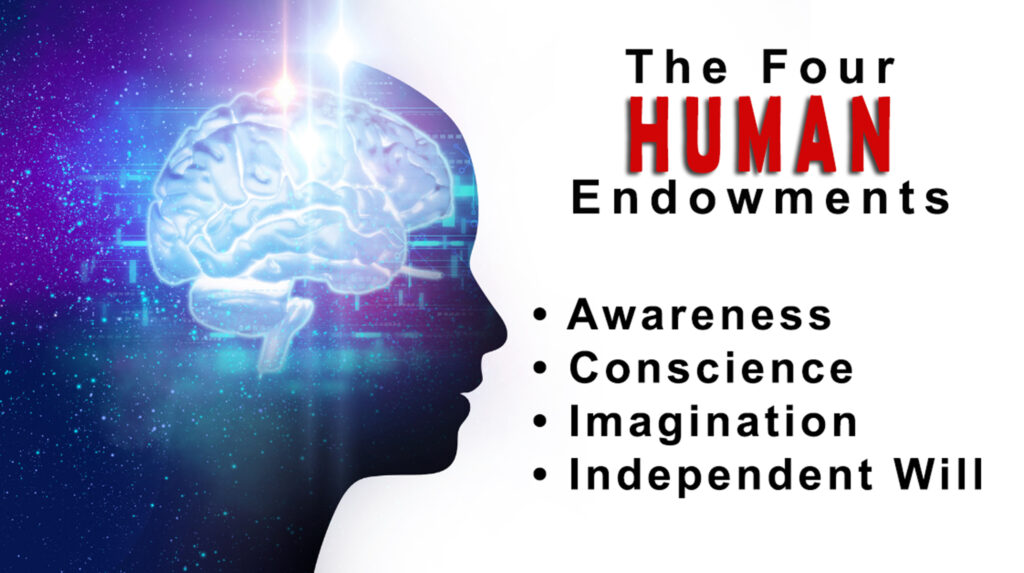
Here’s where my problem-solving skills were set into motion.
Every human being has the potential to tap their primal endowments—unless their faculties are stunted by abuse or self-loathing or both.
Awareness and Conscience. I had the awareness to know I was catastrophizing. I also knew it was not helping. So I sat quietly alone in a room and listened to my conscience. And this is what the voice of wisdom said.
“Allen, you will wither and vanish if you focus entirely on yourself. Your fears will mount and your anxiety will expand. You will become a fading glimmer of your true self.”
“What’s the answer?” I asked.
“You knew what the answer was before you asked the question.”
(Sometimes the conscience can be a stern master—but always profound and annoyingly unvarnished.)
“I have to look beyond myself,” I said.
“Why?” my conscience asked.
“To help those in need.”
“Why?”
“So they can advance themselves?”
“Why?”
“So they can advance the world.”
My conscience paused. “And what will that do for you?”
I smiled a crooked smile. “It will heal me.”
With that, my conscience slipped into his drawing room where he stoked a fire, propped his feet, sipped his tea, and waited peaceably until summoned again.
Imagination. I next employed my imagination, visualizing how I would get to work. I pictured tending to Nita’s needs, calling the mother who wanted me to tutor her children, teaching a teenager the art of conversation, and writing and recording the chapters of In Defiance of the Night—all intended to heal myself while serving others.
Independent will. The last step was the easiest. I had the independent will to turn my imagination into reality—to help Nita dress, to set a tutoring date, to invite the teen and her mother to my home, to sit down and stare at a blank screen and wait for inspiration to knock on my door.
The four human endowments are powerful tools but untapped entirely too often. It’s curious, but doing the right thing tends to awaken our lazy bones. It’s hard to be proactive. It is much easier to sit in a La-Z-Boy recliner and feel sorry for ourselves. But I promise you this. If you can break through the initial inertia, it does get easier. Being proactively responsible is like the launch of a space rocket. The initial takeoff requires enormous power. But when the weight of earth’s gravity is thrown off, the flight in outer space is gentle as a whisper.
***
I began this chapter with this sentence: There’s a difference between the cancer of the mind and the cancer of reality. I’d like to expand on that thought. The “cancer of the mind” is a labyrinth of false turns and dead ends that can torment an otherwise healthy mind. The trick is not to enter the maze. We have better things to do. The “cancer of reality” is based not on anger or fear but on science and the power of the four human endowments.
Still, with all that said, we must admit we are not immortal. If we are not taken by cancer or Parkinson’s, we will be snatched by something else. Although no one knows the hour, we can be sure it will come one day, just as the next storm stirs out of sight beyond the horizon. Our time is finite and ill-defined. Whether we have an hour or a century, would it not be best to live our allotted time with a full commitment to love, peace, and joy?
Of course, the struggle can be arduous, but the journey is lightened when the mission is clear. In the words of the 19th Century German Philosopher, Friedrich Nietzsche, “He who has a why to live can bear almost any how.”
My “why” is service. What is yours?

